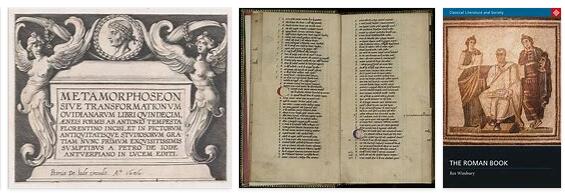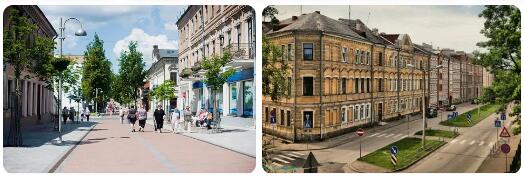Roman Literature
Roman literature, name for the Latin literature of the city of Rome and the Roman Empire from about 240 BC. Until about 500 AD
Only a fraction of the actual literary production has survived; the works of many authors are known only from secondary sources. Apart from a few late antique sources of tradition, what has been preserved is what was copied in the monastery and cathedral schools (scriptorium) of the Middle Ages.
Basics of independence
Already in the 7th century BC The Romans had taken over the written form from the Lower Italian Greeks, but for a long time only used it to record contracts, Senate resolutions or to write down the applicable law (“Twelve Tables Act” 451/450 BC). All utterances in verse and prose were not set down in writing and were limited to everyday life (e.g. wedding and soldier songs, ritual chants, lamentations for the dead and funeral speeches). Only through Rome’s close contact with Greek culture since the 1st Punic War a separate Roman literature emerged. In the period that followed, the Romans took over meters, stylistic devices, materials and genres (e.g. comedy, tragedy, epic poetry, poetry, novel) from the Greeks, with the form of appropriation of the Greek model constantly changing; it encompassed all degrees of independence from the translation (»interpretatio«) to your own editing and redesign (»imitatio«) to the complete re-creation (»aemulatio«). Nevertheless, not everything that was genuinely Roman was suppressed. Thus the genre of “Satura” (satire) and the “Atellana” (atellans) became literary in Sullan times. On the other hand, adopted genres, such as historiography, were completely filled with Roman material. Finally, characteristic of Roman literature is its focus on practical use. Speculative thinking was always alien to the sober Romans; unlike the Greeks, they did not develop their own philosophical systems. With the expansion of the Roman Empire, the provinces were also included in Roman literature. As a result, the national Roman element in literature increasingly receded from the 2nd century AD. At the same time there was a gradual departure from the traditional Roman religion; Christian and Neoplatonic writings met the need for ideological literature in the political turmoil of late antiquity.
The literature of the Archaic and the Pre-Classical Period (about 240 to about 100 BC)
The beginnings: A speech by Appius Claudius Caecus was preserved until the imperial era. Had held in the Senate against the acceptance of the peace offer of Pyrrhus. Nevertheless, according to ancient tradition, Roman literature began in the year 240 BC. When Livius Andronicus staged a Greek drama in a Latin translation. With the idiosyncratic Naevius and the versatile Ennius, he paved the way for Roman poetry through the free reproduction of Greek originals, especially of the classical era. The Latin language experienced its first significant formation in syntax, vocabulary and metrics.
Early drama and prose: the comedies of the burlesque Plautus and urban Terence were still settled in the Greek milieu (»Palliata«), while Afranius in the 2nd century BC. Created the comedy acting in Rome (»Togata«). Ennius, Pacuvius and Acciuswrote tragedies based on the Greek model as well as those with Roman coloring (“Praetexta”). The founder of Latin prose, Cato the Elder, had his own people in mind in his treatise on agriculture (“De agri cultura”) and the “Origines”, the first historical work in Latin (the oldest Roman historians, among others. Q. Fabius Pictor, had still written in Greek). With Cato and the Gracches, Latin rhetoric also reached its first heyday. The satire that Lucilius founded waswithout a Greek model. Noble Romans gathered around Scipio the Younger ,who was friendswith Polybius and Panaitios,and Cicero then followedupon their ideal of education.
The literature of the classical and post-classical period (around 100 BC to 200 AD)
Poetry and prose in the late period of the republic: the age of great internal political upheavals produced a literature in Rome that was on a par with Greek literature. In both established and new genres of lyric poetry, didactic poetry, elegy, rhetorical and philosophical writings, works that were perfect in terms of content and form were created. The development took place in two mutually overlapping phases: During the civil wars, prose dominated, and poetry did not flourish until it was under the rule of Augustus. The dominant theme in both phases was the Roman state. Cicero is considered to be the finisher of Latin art prose, with which the public speech reached its climax. Through his presentation of Greek philosophy, Cicero laid the foundation for philosophizing in Latin. Among the historical works of the epoch, Caesar’s “Commentarii” on the Gallic War and the civil war against Pompey, the biographies of Nepos and the writings of Sallust on the Catilinarian conspiracy and the Jugurthin war stand out. It is Sallust’s archaic language a conscious expression of his republicanism. The work of Pompeius Trogus is only preserved in a late antique extract who wrote the only world history of Roman literature. The extensive Roman history of Livy is committed to the annalistic principle “Ab urbe condita”. The ancient works of the learned Varro wanted to capture the image of sinking ancient Rome in a literary way. The political unrest of the time caused many Romans to retreat into the private sphere. Epicureanism, which Lucretius described in his great didactic poem “De rerum natura”, won numerous followers. The neoteric poet group around their main representative Catullus placed the subjective world of experience in the foreground and, following the example of the Alexandrian poets, elevated the small, sophisticated form to the ideal.
The heyday of the Augustan era: In the last decade of the republic those poets began to write who gave the Augustan era its splendor. In the pursuit of artistic perfection they were connected to the neoterics; However, they also ventured again to large forms and, without excluding the Hellenistic models, resorted to the Greek classics. The Augustan poets had close ties to the state. With his far-reaching epic »Aeneid«, Virgil, who had led the way from neoteric cabaret to bucolic and didactic poetry, gave valid expression to the idea of the Augustan renewal. Horace opened up the iambus and the Aeolian song to Roman literature; he completed the satire and created with his “Ars poetica” a literary theoretical poetry that was effective well into modern times. Ovid achieved his mastery in several genres. With Tibullus and Properz he cultivated the elegy founded by Cornelius Gallus; he wrote a tragedy and created with the epic “Metamorphoses” a version of the Greek myth as a whole, which the modern tradition, v. a. the artistic interpretation, essentially determined. With his preference for linguistic effects, Ovid was already growing beyond the classical period.





